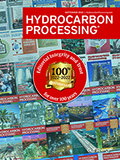
September 2022
Columns
One hundred years ago, a group of individuals saw a need to disseminate the latest technologies and know-how to improve refining operations, safety, management and profitability. At the time, World War 1 had ended roughly 4 yr prior, and global gasoline demand expanded immensely. In turn, new refining capacity was being built around the world to increase production to satisfy burgeoning demand. Simultaneously, new discoveries were being made to produce plastics, fertilizers and other petrochemical products.
1920s–1990s
Over the last 9 mos, <em>Hydrocarbon Processing</em> has provided a detailed history of the origins and evolution of the hydrocarbon processing industry (HPI). This robust analysis chronicled the beginnings of the modern refining and petrochemical industries through the technological advancements that have created the global energy juggernaut the industry has become today.
<em>HP</em> Flashback is a mixture of technical articles, columns and headlines published through the decades by <em>Hydrocarbon Processing.</em> This collection of excerpts provides a look into the major technological advancements and topics/trends in the hydrocarbon processing industry during that timeframe.
The 2000s
This final installment of the History of the HPI series details major events in the refining and petrochemicals industry over the past 20 yr, including stricter regulations/initiatives to curb carbon emissions, a safer and more environmentally friendly way to produce and handle chemicals, significant capital investments to boost production capacity and digital transformation.
The following is a mixture of technical articles, columns and headlines published in the 2000s by <em>Hydrocarbon Processing.</em> This collection of excerpts provides a look into the major technological advancements and topics/trends in the hydrocarbon processing industry during that timeframe.
Industry Pioneers
Carl von Linde was a German scientist and engineer who pioneered new technologies in refrigeration and the invention of air separation and gas liquefaction processes. In the 1870s, Linde’s studies led to an efficient design for refrigeration.

- WestJet buys first Canadian-supplied SAF by Shell Aviation 4/23
- Technip Energies selected by Viridor to perform FEED on the Runcorn energy-from-waste carbon capture project in the UK 4/23
- SINOPEC completes its involvement in Kazakhstan's polyethylene project 4/23
- Neste premieres at Chinaplas: showcasing possibilities of bio-based and recycled materials for plastics 4/23
- Russia's oil refining near 11-month low 4/23
- Haiti fuel terminal operations halted as gangs seize trucks 4/23




